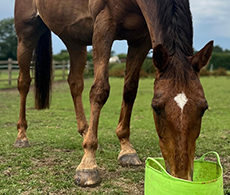
Natural supplements for every horse
From joint support to shiny coats, supplements can play a key role in your horse’s health. Here’s everything you need to know before adding them to their feed.
From deciding whether your horse needs supplementation, to choosing a product and knowing what to expect, selecting the right horse supplements can be confusing. Here, we answer some of the most common questions.
Do horses need supplements?
Not all horses need supplements – but some can
benefit from them, depending on their individual needs,
workload, age and diet.
If your horse is already receiving everything they need from
their diet, they won’t require additional supplements. But
if your horse is not fed a hard feed, it’s difficult to
know exactly what vitamins, minerals and other nutrients they
are getting – and this is when supplementation can be
beneficial.
Horses that may benefit from supplementation include:
- Horses with deficiencies
- Performance horses
- Young horses
- Older horses
- Pregnant or lactating mares
- Horses on restricted grazing
- Horses in highly stressful situations, such as travelling, competition or a change in management
- Horses who do not receive the recommended daily amount of a complete hard feed
What can horse supplements help with?
As supplements are not licensed veterinary medicines, they cannot claim to do anything except support a healthy horse. In the UK, this is regulated by the Veterinary Medicines Directorate (an executive agency sponsored by Defra). The VMD guidelines state that supplements cannot claim to heal or help with a health or behavioural problem, which includes (but isn’t limited to) improving a horse’s movement, boosting immunity or promoting healing.
Because of this, you won’t find supplements claiming to help with a problem. The supplement name, however, may give clues as to what it was formulated for, and the ingredients list will help you work out whether it could be of benefit to your horse.
If you have any health concerns, these should always be discussed with your vet and you may be able to get support from your equine insurance if they diagnose a health problem.
Do horse supplements work?
This really depends on what results you’re expecting. Supplements can be particularly helpful for horses with specific needs or deficiencies, as these can help address nutritional issues that contribute to good health. For instance, joint supplements may include glucosamine or hyaluronic acid to support joint health, while calming supplements often include magnesium.
Vitamin and mineral supplements can also help to counteract any deficiencies and their symptoms. For example, a magnesium deficiency is associated with a range of physical and behavioural signs, such as muscle tremors and nervousness. When introduced to a horse’s diet, magnesium supplements can result in a reduction of these signs in an otherwise healthy horse.
However, it's important to understand that many ingredients are
selected for their known benefits to humans,
and there’s often limited evidence as to their
efficacy in horses. This doesn’t mean they won’t
have similar effects – it could just be that horses absorb
and use the active ingredients in a different way, and there may
not be sufficient studies to prove this.
Remember, not all supplements are created equal, and a balanced,
high-quality diet is always the foundation of good equine
health.
How to choose the best supplements for your horse
Consult a vet or nutritionist when choosing horse supplements. They’ll be able to advise you on whether the supplement is likely to help you achieve the desired effects, and there may be a specific brand they can recommend that they believe to be high quality. They’ll also advise you as to whether there is anything else that may benefit your horse, alongside or instead of supplementation.
Can a horse that takes supplements compete?
Yes, providing they do not contain any prohibited substances. Some manufacturers take part in the BETA NOPS scheme, which shows they take every possible step to prevent naturally occurring prohibited substances entering their products.
Common ingredients found in horse supplements
Here are some common nutrients and ingredients used in supplements, and their reported benefits.
- Garlic acts as a natural fly repellent, supports the immune system, aids digestion and helps respiratory health
- Glucosamine maintains healthy cartilage between joints
- Agnus castus (chaste berry) helps to manage hormones and is an antioxidant
- Biotin is often found in hoof supplements for horses and supports healthy hoof growth
- Brewers’ yeast supports healthy gut microbes and fibre digestion
- Calcium has recognised alkaline properties
- Chamomile flowers support digestion, reduce inflammation and promote healing
- Cinnamon helps regulate insulin levels, support digestion and improve appetite
- Cleavers help remove toxins and waste products, and reduce fluid retention
- Devil’s claw is associated with a range of anti-inflammatory effects
- HA (hyaluronic acid) is widely used for reducing heat, pain and swelling, and is known to help with lubricating joints
- Magnesium positively affects muscle function and nerve transmission
- Marigold flowers are rich in sulphur, which is a natural blood tonic
- MSM (methyl sulphonyl methane) has anti-inflammatory properties
- Omega-3 helps regulate the skin’s oil production
- Omega-6 helps the body respond to inflammation
- Probiotics are often referred to as ‘good bacteria’
- Prebiotics help probiotics to work effectively
- Selenium is an antioxidant and supports muscle development
- Turmeric can support joint health, digestion and overall wellbeing
- Vitamin E supports healthy muscle and nerve function
Found this article useful? Want to see similar content and engage with like-minded riders? Follow us on Petplan Equine’s Facebook page



